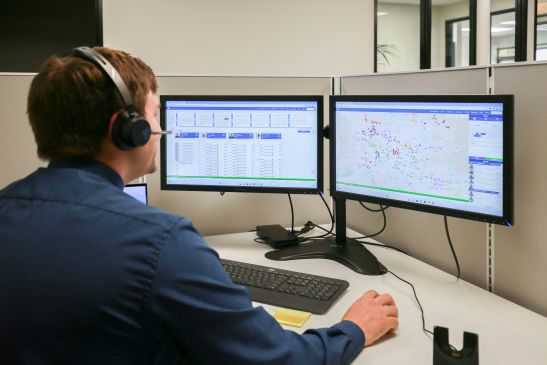Pest Control Service Manager: Job Description & Insights

The pest control industry continues to grow as demand for reliable pest management services rises across residential and commercial sectors. With more customers expecting fast, practical solutions, the need for streamlined operations has never been greater.
The service manager is at the heart of every successful pest control company, responsible for leading pest control technicians, ensuring quality service, and maintaining customer satisfaction.
This guide explores pest control service managers' job descriptions, qualifications, salary insights, and career paths. You’ll also learn how software tools like FieldRoutes support this role by simplifying scheduling, tracking, and team management.
What Are the Primary Responsibilities of a Pest Control Service Manager?
A pest control service manager is central in connecting field operations with office strategy. This individual ensures pest control technicians deliver timely, high-quality service while maintaining efficiency and customer satisfaction. From managing schedules to resolving service issues, the service manager keeps the business running smoothly and profitably.
This position requires leadership, coordination, and balancing daily operations with long-term planning. Service managers often report to a branch manager or operations manager and supervise both service technicians and sales representatives. They are also responsible for ensuring all services comply with health and safety regulations and company policies.
Here are the primary responsibilities of a pest control service manager:
Supervise daily activities of pest control technicians and ensure service quality
Manage team schedules, work orders, and routing
Address customer concerns and ensure customer satisfaction
Monitor inventory, including pesticide, fumigant, and equipment use
Conduct site visits and handle escalated pest problems
Coordinate training programs and onboard new team members
Support quality assurance and ensure compliance with regulations
Generate reports and performance data to assist leadership
Collaborate with other departments to maintain seamless operations
Evaluate jobs and quality assurance programs to ensure efficient operations and compliance with company policies
Ensure equipment is kept clean and well-maintained
Learn how to improve team productivity with these service manager tips.
Next, let’s explore the qualifications needed for this vital role.
What Qualifications Are Required to Become a Pest Control Service Manager?
To become a pest control service manager, candidates typically need a high school diploma or GED. However, some employers may prefer a degree in a related field such as biology, environmental science, or business.
Hands-on work experience in the pest control industry—especially as a pest control technician or team lead—is often required. Many service managers have several years of experience in pest management, which familiarizes them with termite control, handling bed bugs, using pesticides, and applying safety protocols.
Additional qualifications include:
A valid driver’s license and a clean driving record
Completion of a state-certified training program or licensure for pesticide application
Strong knowledge of local and federal safety and public health regulations
Comfort with digital tools and reporting systems
Employers also value applicants who have managed teams or participated in quality assurance and operational oversight.
For more details on launching a career in this industry, see our guide on growing your pest control business.
What Skills Are Essential for a Pest Control Service Manager?
A successful pest control service manager needs a balanced mix of technical knowledge and interpersonal ability. They manage teams, handle scheduling, communicate with customers, and solve problems on the fly—all while keeping operations compliant and efficient.
Multitasking is a daily requirement.
Service managers must manage technician dispatching, performance tracking, customer complaints, and inventory management without sacrificing quality or speed. They also need to be comfortable using business software, CRM tools, and reporting dashboards to streamline tasks and monitor metrics.
These role functions are not limited to specific duties, indicating a dynamic work environment.
These are some of the most important skills for this role:
Excellent communication
Clear and confident communication skills are essential when interacting with pest control technicians, sales representatives, and customers. Whether assigning jobs, explaining treatment plans, or handling escalations, the service manager sets the tone for professionalism.
Problem-solving
Unexpected pest problems, scheduling conflicts, or equipment issues require fast, intelligent decisions. Strong problem-solving skills help managers resolve problems efficiently and keep customers satisfied.
Time management and organization
Managing technician routes, appointment times, and service follow-ups demands strong time management. Tools like FieldRoutes make staying on schedule and meeting daily targets easier.
Leadership and interpersonal skills
The service manager leads by example. Practical leadership skills help motivate staff, manage performance, and create a positive work environment.
Technical knowledge and tech comfort
Understanding termite control, fumigants, and pesticide use is essential. However, today’s managers must also be comfortable with digital tools, CRM systems, and data entry to track customer satisfaction and performance.
What Licenses or Certifications Are Needed for This Role?
To work as a pest control service manager, candidates must meet state licensing requirements and often hold certifications relevant to pesticide application and supervision.
These credentials ensure compliance with public health and safety regulations. Managers must operate with the necessary licenses or certifications relevant to the state or province in which they conduct their business.
Licensing and certification requirements vary by state and the type of pest control services. Most companies also require certification within a specific time frame after hiring.
Standard certifications and licenses include:
State-issued pest control license or applicator certification
Certified Commercial Applicator license (for handling fumigants and restricted-use pesticides)
OSHA safety training or compliance certification
Certified Service Manager programs (offered by industry associations)
Valid driver’s license with a clean driving record
Some states require exams and ongoing education to maintain credentials. Managers should also stay current on state laws, EPA guidelines, and quality assurance standards.
For state-specific guidance, check with your local government department.
Next, look at what service managers can expect regarding salary and compensation.
What Is the Average Salary for a Pest Control Service Manager?
The average salary for a pest control service manager in the United States is approximately $81,170 per year, with total compensation, including bonuses and incentives, averaging around $108,847 annually.
Several factors influence salary levels:
Experience level – Those with more years of experience in the pest control industry can command higher pay.
Company size – Larger pest control companies may offer competitive salaries, performance bonuses, and a complete benefits package.
Location—Salaries vary by region. For example, Viking Pest Control service managers in New Jersey earn between $67,000 and $102,000 annually.
Many roles also include incentives tied to customer satisfaction, quality assurance, and technician performance. Additional benefits often include a company vehicle, paid training, and life insurance.
Compensation packages often include additional perks such as:
Company vehicle for work-related travel
Paid training and professional development opportunities
Life insurance and other health benefits
401(k) retirement plan with company-matching contributions
Sick days as part of a comprehensive benefits package
What Is the Career Growth Potential for a Pest Control Service Manager?
The pest control industry offers strong long-term stability and advancement opportunities for driven professionals. A pest control service manager can grow into higher leadership roles, such as branch manager, regional manager, or even operations director—positions that oversee broader business functions and larger teams.
Career advancement is often tied to:
Demonstrated success in managing pest control technicians and improving customer satisfaction
Completion of advanced training programs and leadership courses
Proficiency with pest control software such as FieldRoutes, which provides tools for automation, technician tracking, and data reporting
Earning additional licenses or certifications related to quality assurance, safety, and public health
The industry’s continued growth, driven by year-round demand for pest control services, makes it a promising field for long-term employment.
Professionals with strong interpersonal skills, problem-solving abilities, and experience with tools like FieldRoutes are well-positioned to advance.
Learn more about the path to leadership in our article on how to grow a pest control business.
Next, let’s explore the most common challenges service managers face—and how to overcome them.
What Are the Biggest Challenges Faced by a Pest Control Service Manager?
The role of a pest control service manager comes with significant responsibilities—and its share of challenges. Managing daily operations while keeping technicians productive and customers satisfied requires focus, flexibility, and the right tools.
Common challenges include:
Scheduling inefficiencies – Without smart automation, managing technician routes can lead to delays, overlaps, or missed appointments. Learn how to avoid this with pest control routing apps.
Technician turnover – Recruiting and retaining skilled pest control technicians can be difficult, especially when team morale or training is lacking.
Customer complaints – Inconsistent service or delayed follow-ups can damage your brand. Strong communication skills and prompt action are essential.
Service inconsistency – Maintaining high standards across teams, especially during peak seasons or expansion, is a constant challenge.
Balancing field and office tasks – Managers must shift between supervising pest control services, handling paperwork, and solving urgent pest problems.
Scaling without proper systems – As your pest control company grows, operations become more complex without a platform like FieldRoutes.
Next, we’ll show how FieldRoutes helps service managers overcome these obstacles and run more efficiently.
How FieldRoutes Helps Pest Control Service Managers Streamline Operations
Managing a busy pest control company without the right technology can lead to daily frustration for any service manager. Whether it’s inefficient routing, technician no-shows, missed customer follow-ups, or unreliable reporting, these challenges can derail productivity and damage customer satisfaction and ultimately, your bottom line.
That’s where FieldRoutes comes in.
FieldRoutes offers a complete pest control software solution designed to solve the biggest operational hurdles service managers face.
Here’s how it helps:
Route optimization – Automates technician routes based on job location, priority, and availability, eliminating scheduling overlaps and wasted time.
Technician tracking – Uses real-time GPS to monitor where pest control technicians are during the day, helping managers respond to delays or changes instantly.
Customer communication tools – Sends automatic appointment reminders, service updates, and post-service messages, reducing missed visits and complaints.
Performance dashboards—Provide real-time data on technician productivity, service history, and team efficiency, making it easier to identify trends and improve training.
Automation features Streamline tasks like invoicing, scheduling, follow-ups, and recordkeeping, allowing managers to focus on coaching staff and growing the business.
With these tools, FieldRoutes empowers pest control service managers to maintain high service quality, scale operations efficiently, and reduce pressure on both field and office teams.
It transforms daily chaos into organised, data-driven workflows.
It’s Your Turn Now
The pest control service manager is a vital leader who drives team performance, ensures customer satisfaction, and keeps operations running smoothly. This role demands strong leadership, communication, and problem-solving skills, from managing schedules and overseeing pest control technicians to solving pest problems and improving service quality.
Hiring qualified individuals is crucial to maintaining high standards and achieving company goals. Additionally, the comprehensive benefits package includes company-paid holidays, floating holidays, and medical benefits that start immediately upon hire for full-time colleagues.
With growing opportunities to advance into roles like branch manager or operations manager, it’s a promising path for those with ambition and experience.
Modern tools like FieldRoutes simplify the job by automating daily tasks, tracking technician productivity, and improving customer communication. They allow service managers to lead strategically rather than getting buried in manual processes.
Curious how FieldRoutes can support your team?
Book a free demo when you’re ready.
Frequently Asked Questions (FAQs)
What’s the difference between a service manager and a branch manager?
A service manager oversees daily technician operations, scheduling, and customer service, while a branch manager manages the overall location, including sales, budgets, and staffing. Service managers often report to branch managers as part of the leadership team.
Do I need pest control field experience to become a service manager?
Yes, most companies prefer candidates with several years of experience as a pest control technician or in a related role. Field knowledge helps managers supervise effectively, understand service standards, and train staff. Learn more about growth paths in our career insights guide.
Is certification required in every state?
Yes, most states require pest control service managers to hold or obtain a license or applicator certification. Requirements vary, so check with your state agency or register with the Pennsylvania Department of State to get started.





